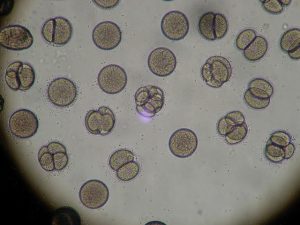Featured Products
Explore Products
- In-Stock Tumor Cell Lines
- Human Orbital Fibroblasts
- Human Microglia
- Human Pulmonary Alveolar Epithelial Cells
- Human Colonic Fibroblasts
- Human Type II Alveolar Epithelial Cells
- Human Valvular Interstitial Cells
- Human Thyroid Epithelial Cells
- C57BL/6 Mouse Dermal Fibroblasts
- Human Alveolar Macrophages
- Human Dermal Fibroblasts, Adult
- Human Lung Fibroblasts, Adult
- Human Retinal Muller Cells
- Human Articular Chondrocytes
- Human Retinal Pigment Epithelial Cells
- Human Pancreatic Islets of Langerhans Cells
- Human Kidney Podocyte Cells
- Human Renal Proximal Tubule Cells



 HighQC™ Mouse Embryonic Stem Cells are derived from healthy male C57BL/6N mouse blastocysts and display a typical undifferentiated round morphology with robust colony formation. They possess a normal male (XY) karyotype and express key pluripotency markers such as Oct-4 and Nanog, commonly detected via immunocytochemistry or qPCR. These ESCs are non-tumorigenic but exhibit full pluripotency, capable of contributing to germline chimera formation. Cells are cultured on either SNL7 fibroblast feeder layers or gelatin-coated plates with 10–15% serum to maintain their undifferentiated state. They are maintained under conditions suitable for long-term self-renewal. They are typically passaged up to 20 times while retaining pluripotency and genomic stability. They can differentiate into all three germ layers, supporting use in developmental biology. Viral screening (HIV, HTLV, mycoplasma) is recommended prior to use. These cells are ideal for gene editing, lineage tracing, and transgenic model creation.
HighQC™ Mouse Embryonic Stem Cells are derived from healthy male C57BL/6N mouse blastocysts and display a typical undifferentiated round morphology with robust colony formation. They possess a normal male (XY) karyotype and express key pluripotency markers such as Oct-4 and Nanog, commonly detected via immunocytochemistry or qPCR. These ESCs are non-tumorigenic but exhibit full pluripotency, capable of contributing to germline chimera formation. Cells are cultured on either SNL7 fibroblast feeder layers or gelatin-coated plates with 10–15% serum to maintain their undifferentiated state. They are maintained under conditions suitable for long-term self-renewal. They are typically passaged up to 20 times while retaining pluripotency and genomic stability. They can differentiate into all three germ layers, supporting use in developmental biology. Viral screening (HIV, HTLV, mycoplasma) is recommended prior to use. These cells are ideal for gene editing, lineage tracing, and transgenic model creation.